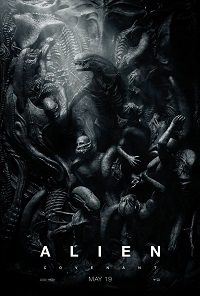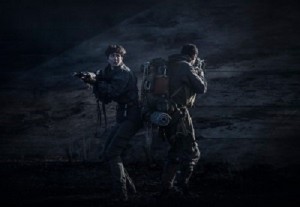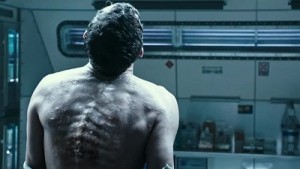 Ridley Scott’s “Alien: Covenant” opens with a catastrophic incident: a solar something-or-other that awakens a deep space vessel’s crew from cryo-sleep, and results in the death of a key team member. The deceased’s widow, second-in-command Somebody-or-other Daniels (Katherine Waterson), locks herself in her quarters to grieve, and in Hollywood fashion, she has laid out every photograph she has of her husband in a sort of makeshift shrine. This narrative shorthand seems to be building toward a reveal, as we never see the dead husband clearly; and the centerpiece of this memorial is a tablet, lying face-down. Who is he? Is he someone we’ve encountered in previous films? What twist or foreshadowing awaits us? Slowly and with purpose, Daniels takes the tablet in both hands, and as she turns it over, we’re given our first look at the smiling face staring back, and – wait a minute, is that James Franco…? What the hell is James Franco doing in this movie…?
Ridley Scott’s “Alien: Covenant” opens with a catastrophic incident: a solar something-or-other that awakens a deep space vessel’s crew from cryo-sleep, and results in the death of a key team member. The deceased’s widow, second-in-command Somebody-or-other Daniels (Katherine Waterson), locks herself in her quarters to grieve, and in Hollywood fashion, she has laid out every photograph she has of her husband in a sort of makeshift shrine. This narrative shorthand seems to be building toward a reveal, as we never see the dead husband clearly; and the centerpiece of this memorial is a tablet, lying face-down. Who is he? Is he someone we’ve encountered in previous films? What twist or foreshadowing awaits us? Slowly and with purpose, Daniels takes the tablet in both hands, and as she turns it over, we’re given our first look at the smiling face staring back, and – wait a minute, is that James Franco…? What the hell is James Franco doing in this movie…?
So begins “Alien: Covenant,” the latest in a series of prequels named after the ship that both transports and subsequently strands our cast of expendable characters, while more or less announcing the theme of the film you’re about to watch. It’s not a promising start; less so because Franco is a bad or unwelcome actor (he isn’t and he’s not), but because his giant, earnest, weed-fueled grin is so out of place with Scott’s traditionally cold and dyspeptic style. Plus, the video on Daniels’ tablet shows Franco…rock climbing. While telling his wife he loves her. In the form of a video message. As his climbing buddy slips and nearly falls to his death. Which neither Franco nor the Almost Dead Friend seem rattled by. And then laugh about. And then disappear for the rest of the movie.
The confusion (and weirdness) is short-lived, and makes a hard right into very familiar territory very quickly. As if in response to “Prometheus,” Scott’s 2012 “Alien” prequel that infuriated fans by giving them everything except the “Alien” prequel they wanted, “Covenant” is the director throwing up his hands in defeat and saying, “Okay, fine.” The fact that the title contains the word “Alien” more or less gives up the game. The mythological world-building initiated by “Prometheus” is abandoned entirely. If a more traditional “Alien” prequel is what you want, “Covenant” delivers. Whether or not that’s a good or bad thing is another argument altogether.
 As such, there’s nothing particularly new on display. Another crew ends up marooned on another faraway world; one inadvertently becomes a host for a neomorph; one by one, they all die. Scott’s penchant for short-haired, plucky female leads is again recycled in the form of Daniels, and this time we get not one but two androids, both played again by Michael Fassbender. While perhaps a visual marriage of “Prometheus” and the original 1979 film, this is essentially a remake of “Alien” – the same characters, the same beats, and the same set pieces, mixed up just enough to be different, but otherwise so familiar as to feel unnecessary. The only element one could label original to this film is the evolution of the titular creatures from what we saw in “Prometheus” into the familiar xenomorphs we all know so well, filtered through philosophical musings on the nature of gods and men (and aliens).
As such, there’s nothing particularly new on display. Another crew ends up marooned on another faraway world; one inadvertently becomes a host for a neomorph; one by one, they all die. Scott’s penchant for short-haired, plucky female leads is again recycled in the form of Daniels, and this time we get not one but two androids, both played again by Michael Fassbender. While perhaps a visual marriage of “Prometheus” and the original 1979 film, this is essentially a remake of “Alien” – the same characters, the same beats, and the same set pieces, mixed up just enough to be different, but otherwise so familiar as to feel unnecessary. The only element one could label original to this film is the evolution of the titular creatures from what we saw in “Prometheus” into the familiar xenomorphs we all know so well, filtered through philosophical musings on the nature of gods and men (and aliens).
Yet for any complaints about retreading familiar ground and playing it absolutely one hundred percent safe on a narrative and thematic level, “Covenant” isn’t afraid to push the puke button in a way that raises both the bar and the gorge. Body horror is front and center here. People die in horrifically violent fashion, turned literally inside out during ferocious birthing sequences. There’s so much gore that one character actually slips on it, resulting in her own barf-baiting demise. The black humor seems at times intentional rather than accidental, as one pre-coitus couple is interrupted during their imminent lovemaking by a hunting xenomorph; the man is penetrated by a phallic appendage, and the resulting spray hits his naked female companion right in the face. The implication is lost on no one.
The somewhat goofy extremes of the excessive violence is enough to make one suspect Ridley Scott of developing a sense of humor. Never a director known for warmth, he seems more comfortable dealing with twin androids David and Walter, as they literally embody the calculated nature of Scott’s overarching body of work. The direction and construction of the film is as cold as space, and as clinical as surgery. There’s no genuine interest in the characters as actual, living people: the condescending and belittling opinion of flesh and blood organisms held by Fassbender’s walking, talking construct David, is reflected as ever in Scott’s treatment of his humanoid subjects. His work is, as always, aloof, detached, and seemingly assembled by a highly evolved computer that mimics humanity but doesn’t quite understand it, and clearly doesn’t want to. For a film about covenants, particularly in regards to Creator and Created, we see the care and craftsmanship that goes into the act of cinematic birthing; but the people? They’re just there to populate the landscape. They’re moveable pieces, all part of an ecosystem dependent on their existence but only insofar as they’re necessary organisms to resent for demanding purpose.
 “Alien: Covenant” is nasty, mean-spirited, and utterly disgusting, which automatically makes it more entertaining (though not necessarily more interesting) than its predecessor. Nonetheless, it suffers from “Revenge of the Sith” Syndrome, as it exists simply to build a bridge from one film to the next, the destination already known. There are no surprises, and therefore, no real tension. All characters are expendable, and even worse, superfluous, because we already know how it ends.
“Alien: Covenant” is nasty, mean-spirited, and utterly disgusting, which automatically makes it more entertaining (though not necessarily more interesting) than its predecessor. Nonetheless, it suffers from “Revenge of the Sith” Syndrome, as it exists simply to build a bridge from one film to the next, the destination already known. There are no surprises, and therefore, no real tension. All characters are expendable, and even worse, superfluous, because we already know how it ends.
But in a franchise known for two classic entries followed by a slew of terrible sequels, prequels, and crossovers, “Alien: Covenant” is one of the better and more entertaining additions to the franchise, simply for knowing what it is and who it’s meant for. It’s a tense and sometimes cruel take on an already tense and sometimes cruel story; and after the last one, anyone would prefer goosebumps (and a little James Franco) to glazed eyes.
Directed by Ridley Scott
Written by John Logan, Dante Harper, Jack Paglen, and Michael Green
Rated R for sci-fi violence, bloody images, language and some sexuality/nudity



Leave a Reply
You must be logged in to post a comment.